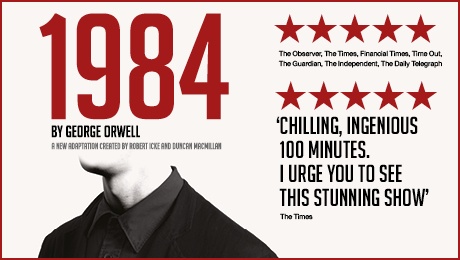Stage Blood and Jetlag, or an Ex Urbe Visit to London
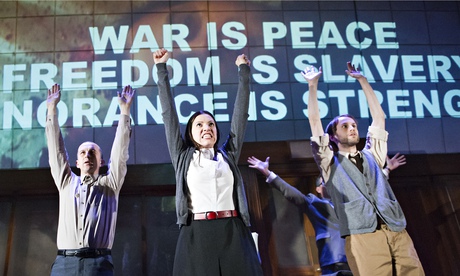
The British Library often brings me here to London, to use the mass of early Italian books which were transported to the UK by the book collecting mania which was endemic in the wealthy classes in last two centuries, but this year the library has teamed up with Loncon (the London-hosted World Science Fiction Convention, or Worldcon) to bring many of my friends as well. So while I travel (and don’t have enough reference books or tranquility to do justice to another post on skepticism) this seems a good moment to share what is half a reflection on my enjoyment of London, with something of a guide recommending activities, and half a series of of some of the more distinctive plays I’ve seen here.
My approach to enjoying London is very much a hybrid of my approaches to Venice and Disneyland, and has never failed to work out delightfully.
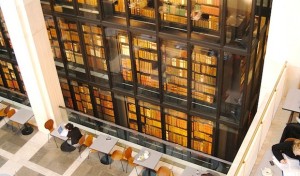
The Venice half of the strategy is to do everything I can to avoid having a plan. I simply arrange cheap accommodations as close as possible to an exciting walkable center that’s easy to find again, and then wander at random. Unpredictable intersections of twisting streets reveal layers of exciting architecture, monuments, vistas, fun people with creative fashions speaking many languages, and in the case of London (though not Venice!) excellent food. When I stumble upon a museum I go in it; a church I have a look; concert I have a listen, and by avoiding having anything to do or anywhere to be I can just look and walk and look and walk until the long summer days stretch on into suppertime sunsets.
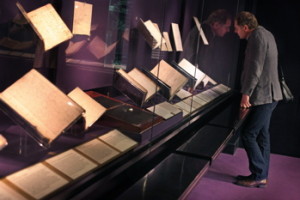
My usual Venice hotel is behind St. Mark’s Square because it’s the only thing in Venice one can reliably find, while my favorite London stop is the youth hostel directly across from the British Library. Being right by King’s Cross St. Pancras, the hosel is a short tube ride from everything, and a comfortable long walk southwest takes me past many of my favorite spots. First are the specialty bookshops that cluster around the British Library like offshoots of a cypress tree (Judd Books and Gay’s The Word). Next, the open park at Russell Square which is always packed with picnicers. Next I pass the British Museum, where I might pop in to visit some Mesopotamian or Greek treasures, or just visit the strip of shops out front, to gaze at the lovely but staggeringly overpriced replica antiquities in It’s All Greek, or the real antiquities in the windows of the less-coin-specific of the two Coincraft shops, where I occasionally buy something small (I got a remarkably affordable 400 BC Attic little jug there, and a 1,000 BC Persian spearhead; they also have a bin of 1st to 4th century Roman Empire oil lamps for 45 pounds a pop, less if you get two and haggle, which for the sparkle of awe they bring to someone who’s never touched an artifact over 1,000 years old is definitely worth the price).
A few blocks further south I enter the theater district, stop off at the nerd mecca Forbidden Planet, and enter the warren of zigzagging streets surrounding Leicester Square and Covent Garden where I can spend a whole afternoon just walking. The whole area is full of London’s signature layered architecture, crumbling stone and decorated brick and sparkling steel all in a pile together, with colorful woodwork and hidden alleys. I would swear that once I went down an alley and wound up in some kind of Chinatown, where I ate lotus buns and steamed bao, but I’ve never managed to find it again, and it’s just possible it might have been a dream. Unable to find that again this trip, I contented myself with falafel, tapas, a Jamaican curried goat pie, and  a hearty Egyptian street food called Koshari, which is a mixture of pasta, rice and lentils with chickpeas, spicy tomato, caramelized onions and spices, vegetarian but with that mix of heavy complex carbs and partial proteins that make it as filling and long-term sustaining as any meat—the shop is called Koshari Street (and they deliver!). Oh, and gelato; two good gelato places in the area, La Gelateria (27 New Row) and a branch of the Italian chain Amorino. If my path takes me southward far enough, I might stumble by accident on Trafalgar Square, and visit the National Gallery or Portrait Gallery, or stray as far as the river if my evening plan wants me to cross. And if at any time I’m too tired to want to walk back, a saturation of underground stations will bring me back to King’s Cross. (One detail relevant to this strategy: I seem to have the magic power that whenever I come to London the weather is beautiful and sunny the whole time, but the ‘wander outside’ plan may not work so well for those who don’t share this inexplicable blessing).
a hearty Egyptian street food called Koshari, which is a mixture of pasta, rice and lentils with chickpeas, spicy tomato, caramelized onions and spices, vegetarian but with that mix of heavy complex carbs and partial proteins that make it as filling and long-term sustaining as any meat—the shop is called Koshari Street (and they deliver!). Oh, and gelato; two good gelato places in the area, La Gelateria (27 New Row) and a branch of the Italian chain Amorino. If my path takes me southward far enough, I might stumble by accident on Trafalgar Square, and visit the National Gallery or Portrait Gallery, or stray as far as the river if my evening plan wants me to cross. And if at any time I’m too tired to want to walk back, a saturation of underground stations will bring me back to King’s Cross. (One detail relevant to this strategy: I seem to have the magic power that whenever I come to London the weather is beautiful and sunny the whole time, but the ‘wander outside’ plan may not work so well for those who don’t share this inexplicable blessing).
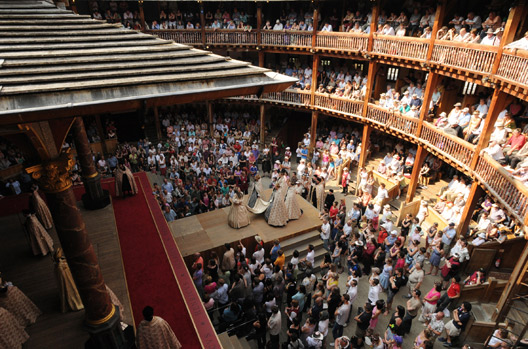
The Disneyland half of my strategy involves tailoring this peaceful meander around maximizing the one unique activity which is so brilliant and unique that it’s worth tailoring everything else to get to do it as many times as possible. At Disneyland this is Space Mountain. In London it is going to the theater. I count it a successful London visit if I’ve been to the theater more times than I spent nights, making intelligent use of matinees and how the proximity of many theaters makes it possible to catch one show in the afternoon and another the same evening, most days at least (Sunday and Monday present challenges since most of the shows are closed). What makes this work so well is that all the plays are good in London, even the ones that aren’t. What I mean by this is that the acting, direction and general production standards are so high that even when it’s a show which I might be skeptical about elsewhere I can rely on it being so well done that I’ll enjoy them anyway. Over separate visits I’ve thoroughly enjoyed the brilliant writing and acting of The Tempest and The Importance of Being Earnest, the daring and precarious experiments of stage adaptations of The Lord of the Rings and 1984, the stagecraft spectacles of War Horse and The Lion King, even the formulaic nostalgia of Lady in Black and The Mousetrap. And I always go to the Globe, consistently, unquestioningly, sometimes without even checking to see what show is on, I just know there’s a magical spot on the Earth where you can show up at 7 pm, give them 5 pounds and they’ll let you see Shakespeare, and it’s always good. And it is always good. Even The Taming of the Shrew and Love’s Labors Lost were thoroughly enjoyable, even though their combinations of unpalatable period sexism and general vacuousness make them hard to take in anything but an extraordinary performance.
Theater contributes especially to my jetlag strategy. Going from West to East (US to Europe) I have found it most effective to take an overnight flight, get 2 or 3 hours’ sleep on the plane, and arrive in London early in the morning. The essential step is to make sure I don’t nap that first day, exhausted as I am; if I can force myself to stay up until a good solid bedtime, 10 or 11 pm, then I can go to bed, get up at a normal time, and my clock is solidly reset onto London time thereafter with no further trouble. But how to keep myself awake during that long draggy first day? All I want to do is nap, but even a quick nap will doom me to sleepless nights and draggy days for close to a week. Solution: theater. I walk around the West End all morning, acquiring tickets for a double dose—matinee and evening shows—of theater, and thus can rely on writing, acting, sound and spectacle to keep me thrilled and awake until well after dark. Depending on the day of the week the Globe can supply one or both, but this time I was saving the Globe shows (King Lear and Antony and Cleopatra) until friends joined me a couple days later, so I booked the stage blood double-whammy: 1984 followed by Richard III.
The first was a new stage adaptation of 1984 by Robert Icke and Duncan Macmillan, in London for a short run, and excellent. Powerful. Vivid. When I close my eyes now I can still see Winston in the chair with OBrien looming over, against the stark glowing white walls of Room 101. And the agony on Winston’s face. I was sufficiently impressed that I bought tickets to see it again with friends, and returned the next day to deliver a letter to the cast expressing my enthusiasm, though the playwright deserves it too. The script and structure made great use of the fact that we in the audience all know the story already, know what’s coming, know that striking girl in the red sash has to be Julia before anyone speaks, and know where it has to end.
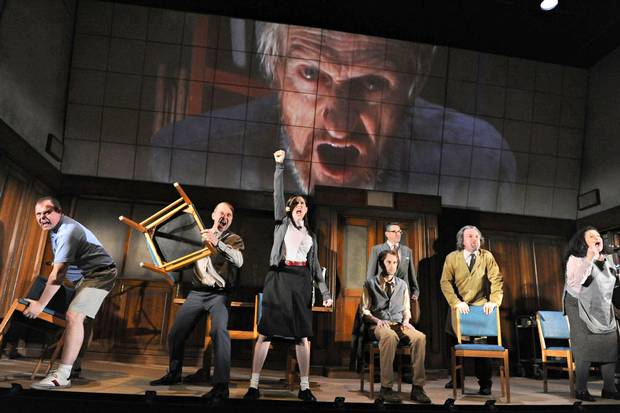 The adaptation blurs time, using repeated actions and phrases and glimpses of thing out of order. Winston hears O’Brien’s voice already interrogating him in his head long before he is taken to the Ministy of Love, a blur which creates a metatextual framing: is this the real, live Winston experiencing these events, or are we already in Room 101 and these are his memories breaking down under the pain? And the play also incorporates Orwell’s own framing story, the final section of the novel which is written as if by someone from a later period after the 1984 regime has fallen, who is examining Winston’s account as an historical document; by presenting this early in the play, the adaptation further blurs time: are we seeing live events, Winston’s decaying memory’s, a later period’s ideas of Winston’s account, or both being read by us, the real live reader? The mixture lets us experience all of these layers at once, while all of them are trapped in the same inevitable story. As we watch the events march inevitably forward we are all—Winston, Julia, O’Brien, Orwell, the actors, the viewer—equally aware what room we will soon enter, or in a sense have always already entered. Reuse of actors, most of whom play numerous characters over the course of the performance, highlights in a literal physical sense how the whole populace of Orwell’s dystopia is complicit in the horror that enslaves them, a dystopia made of its people, even Winston as he turns up to work each day to delete the records of people who have been erased, as he will be erased in turn. The play has no intermission, no break or escape, which I think was a wonderful choice, and gave it a powerful momentum. The live enactment of the Two Minutes’ Hate left one deeply terrified of human beings (it had rather the same effect as the room full of Otto Dix I once saw in a Dada exhibition), and Room 101 itself was… well, one of these rare cases where something has infinite buildup and then lives up to that buildup completely, by being precisely what it always had to be. And they have made such great advances with stage blood.
The adaptation blurs time, using repeated actions and phrases and glimpses of thing out of order. Winston hears O’Brien’s voice already interrogating him in his head long before he is taken to the Ministy of Love, a blur which creates a metatextual framing: is this the real, live Winston experiencing these events, or are we already in Room 101 and these are his memories breaking down under the pain? And the play also incorporates Orwell’s own framing story, the final section of the novel which is written as if by someone from a later period after the 1984 regime has fallen, who is examining Winston’s account as an historical document; by presenting this early in the play, the adaptation further blurs time: are we seeing live events, Winston’s decaying memory’s, a later period’s ideas of Winston’s account, or both being read by us, the real live reader? The mixture lets us experience all of these layers at once, while all of them are trapped in the same inevitable story. As we watch the events march inevitably forward we are all—Winston, Julia, O’Brien, Orwell, the actors, the viewer—equally aware what room we will soon enter, or in a sense have always already entered. Reuse of actors, most of whom play numerous characters over the course of the performance, highlights in a literal physical sense how the whole populace of Orwell’s dystopia is complicit in the horror that enslaves them, a dystopia made of its people, even Winston as he turns up to work each day to delete the records of people who have been erased, as he will be erased in turn. The play has no intermission, no break or escape, which I think was a wonderful choice, and gave it a powerful momentum. The live enactment of the Two Minutes’ Hate left one deeply terrified of human beings (it had rather the same effect as the room full of Otto Dix I once saw in a Dada exhibition), and Room 101 itself was… well, one of these rare cases where something has infinite buildup and then lives up to that buildup completely, by being precisely what it always had to be. And they have made such great advances with stage blood.
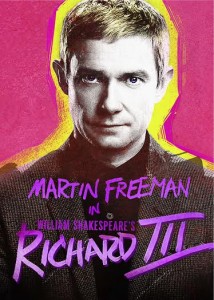 Ten times as much stage blood, sloshed in all directions and over all characters, gave the evening show of Richard III all the crowd-thrilling power Shakespeare intended. I hadn’t bought a ticket in advance and tickets were almost unachievable, because it was both very good by a very good director (Jamie Lloyd) and starred Martin Freeman (Watson in Sherlock; Bilbo in the Hobbit movies), which added to the general population of Shakespeare and Theater lovers a 40% additional attendance by bouncy Sherlock fangirls. Seats were scarce, but arriving two hours in advance made me first in line for the last-minute returned tickets, providing a fascinating opportunity for polyglot as I and a Sweedish actress and two French Sherlock fans cooperated to manage taking turns running off for sandwiches with our mixture of imperfect languages. Ten minutes before the show my patience was rewarded. I rarely enjoy Shakespeare re-set in modern costume, but this was a delightful exception, set almost in the round with a stage crammed with 1950s-ish office furniture—desks with huge brown typewriters and avocado green rolling chairs—recasting the historical setting so that the aftermath of war was not a distant civil war but the wake of WWII. This gave a visceral immediacy how terrible it is to see the hard-earned peace turned into war again by Richard’s selfish schemes. The violence too felt very modern and therefore real, and the production succeeded in something I have seen several attempt: using contemporary violence tropes from Hollywood to recreate the feeling a
Ten times as much stage blood, sloshed in all directions and over all characters, gave the evening show of Richard III all the crowd-thrilling power Shakespeare intended. I hadn’t bought a ticket in advance and tickets were almost unachievable, because it was both very good by a very good director (Jamie Lloyd) and starred Martin Freeman (Watson in Sherlock; Bilbo in the Hobbit movies), which added to the general population of Shakespeare and Theater lovers a 40% additional attendance by bouncy Sherlock fangirls. Seats were scarce, but arriving two hours in advance made me first in line for the last-minute returned tickets, providing a fascinating opportunity for polyglot as I and a Sweedish actress and two French Sherlock fans cooperated to manage taking turns running off for sandwiches with our mixture of imperfect languages. Ten minutes before the show my patience was rewarded. I rarely enjoy Shakespeare re-set in modern costume, but this was a delightful exception, set almost in the round with a stage crammed with 1950s-ish office furniture—desks with huge brown typewriters and avocado green rolling chairs—recasting the historical setting so that the aftermath of war was not a distant civil war but the wake of WWII. This gave a visceral immediacy how terrible it is to see the hard-earned peace turned into war again by Richard’s selfish schemes. The violence too felt very modern and therefore real, and the production succeeded in something I have seen several attempt: using contemporary violence tropes from Hollywood to recreate the feeling a 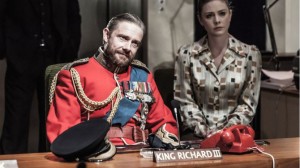 period play would have had of showing the audience violence that feels like the violence we see in real life instead of something gilded and distanced by antiquity (a production of Webster’s White Devil which I will shortly see in Stratford is trying the same). In some of the murders the audience could tell from the stage setup and general knowledge of Hollywood how the murder had to end, and I felt myself almost silently cheering for the murders to come as expectation’s tension ripened inside me. Martin Freeman proved an amazing Richard, perfectly balancing his endearing and repugnant facets to woo the crowd enough but not too much, playing with audience complicity. Also remarkable was the fact that, instead of cutting Margaret’s curse (as so many productions do when you haven’t just sat through Henry VI so don’t really care about her), this production expanded it into a centerpiece which dominated the story and balanced against Richard like a second real human power at work in the story instead of events being Richard vs. Fate, as it often feels, or Richard vs. the-trope-that-villains-aren’t-allowe- to- win. I didn’t have one of the seats where you actually got spattered with stage blood, but I was offered one, and I was tempted. Needless to stay, it kept me awake and delighted until a healthy bedtime, and I promptly bought tickets to see it again with friends as well.
period play would have had of showing the audience violence that feels like the violence we see in real life instead of something gilded and distanced by antiquity (a production of Webster’s White Devil which I will shortly see in Stratford is trying the same). In some of the murders the audience could tell from the stage setup and general knowledge of Hollywood how the murder had to end, and I felt myself almost silently cheering for the murders to come as expectation’s tension ripened inside me. Martin Freeman proved an amazing Richard, perfectly balancing his endearing and repugnant facets to woo the crowd enough but not too much, playing with audience complicity. Also remarkable was the fact that, instead of cutting Margaret’s curse (as so many productions do when you haven’t just sat through Henry VI so don’t really care about her), this production expanded it into a centerpiece which dominated the story and balanced against Richard like a second real human power at work in the story instead of events being Richard vs. Fate, as it often feels, or Richard vs. the-trope-that-villains-aren’t-allowe- to- win. I didn’t have one of the seats where you actually got spattered with stage blood, but I was offered one, and I was tempted. Needless to stay, it kept me awake and delighted until a healthy bedtime, and I promptly bought tickets to see it again with friends as well.
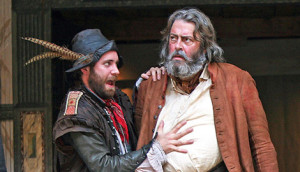
Despite all this, I fully expect the best theater I see in London this trip to still be coming up: Shakespeare at the Globe. I always unquestioningly see everything that’s on at Shakespeare’s Globe, no matter what it is. Standing tickets are only five pounds (and have the best view by far). Recent productions have concentrated on the comedy, even in tragedies and historical plays, since there are always humorous scenes or scenes with clowns and comic characters. Modern directors tend to try to play these scenes for pathos, seriously or as social commentary, but the Globe is instead doing what my studies of period theater confirm is more likely to have been the original style: playing up the humor to the maximum, with the addition of lots of physical improvisation in the style of Commedia dell’Arte. The result turns what are often the boring (or excluded) scenes into refreshing and hilarious windows on period humor, lively and intense and incredibly entertaining. For those curious, I cannot recommend enough the DVD of their Henry IV, which has such a stunningly entertaining Falstaff that many sections which had never made much sense in any other production suddenly come together as rollicking and wonderful centerpiece scenes.
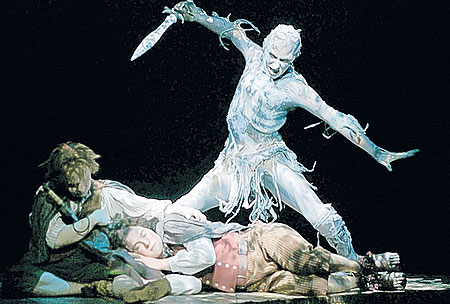 And since I’ve mentioned it, I should finish by sating your curiosity: Yes, there
And since I’ve mentioned it, I should finish by sating your curiosity: Yes, there was is a The Lord of the Rings stage musical; no, it was not a particularly good plan. I recently learned it’s going to come back and have a world tour starting in 2015, but the version I saw in London previews in 2007 was—much like the achievements of Voldemort—terrible, but great. I saw it on a ten pound discounted last-minute ticket, and morbid curiosity has never been better rewarded. Some parts were brilliant. Hobbiton and Bilbo’s birthday party could never have a better setting than a lively, colorful stage full of cheerful, dancing hobbits and raucous music. The sets and costumes spared no expense. Gollum was magnificent, incredible physical acting and great writing too; every time Frodo had a song Gollum would repeat it in an eerie minor key, to great effect, and the actor received a well-deserved standing ovation. The stage itself was complicatedly segmented so they could raise and lower bits of turrain to create mountains and hills and towers, and the long march across the mountains looked every 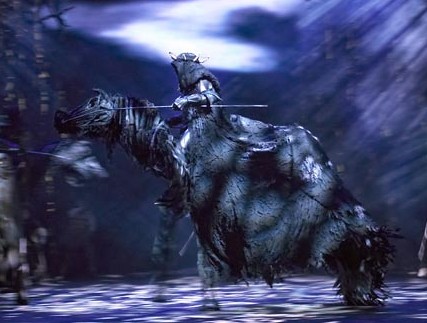 bit as exhausting as it should be. Shelob was also incredible: they blacked out the house completely except for a tiny spotlight on Frodo, and had an enormous puppet but all you could see were the vague shadows of the legs just moving in the edge of the light, with the body always invisible, far more terrifying than anything CG has produced. Orcs came out during intermission to terrorize the audience, which was fun, using weird stilts, which was… weird. And the horseback Nazgul were excellent, great horse frames and billowy black cloaks which were genuinely awesome… almost as awesome as the gazelles from The Lion King musical… but then again a Nazgul inherently is about fifty jillion times as interesting as a gazelle, so perhaps that isn’t saying much, or perhaps it says more about Julie Taymor’s skill than about the play.
bit as exhausting as it should be. Shelob was also incredible: they blacked out the house completely except for a tiny spotlight on Frodo, and had an enormous puppet but all you could see were the vague shadows of the legs just moving in the edge of the light, with the body always invisible, far more terrifying than anything CG has produced. Orcs came out during intermission to terrorize the audience, which was fun, using weird stilts, which was… weird. And the horseback Nazgul were excellent, great horse frames and billowy black cloaks which were genuinely awesome… almost as awesome as the gazelles from The Lion King musical… but then again a Nazgul inherently is about fifty jillion times as interesting as a gazelle, so perhaps that isn’t saying much, or perhaps it says more about Julie Taymor’s skill than about the play.
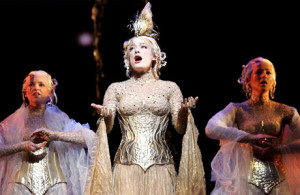 You may have sensed that I’ve rather run out of the brilliant facets of the musical and am approaching the more… well… I applaud the decision not to have Gandalf sing at all. I do not applaud the decision to have Gimli sing, and speak, in a weird high squeaky voice all the time. Nor the decision to have Legolas make bizarre hyperstylized grand gestures every time he spoke, as if he was constantly doing sign language in an incomprehensible elven gesture code. Nor other things. For example, some people like the costume Galadriel wears in the films, or in this piece of art, or that piece of art, and some people hate them, but no matter what factions we usually fall into regarding Galadriel costuming I think we can all agree that Gold Sparkly Boustier is not really anywhere near anything one could ever possibly… I mean… how? Why? Help…? Galadriel was, in fact, a lot of the centerpiece of what made the show… odd. You see, the trilogy has a lot of great characters, but it doesn’t actually have a lot of female characters, and those it has don’t have a lot of page count. But musicals like to have lots of singing, and like to have a flashy female lead people care about to put on posters and promote. So they wanted lots of singing parts for a woman, one woman, consistently throughout the story, even during the long stretches where there aren’t any. So they picked Galadriel, and had her have songs. Lots of songs. Lots of songs all the time for no reason. Frodo and Sam would be trudging along through Mordor dum-de-dum-de-dum and Sam would say, “Hey, Frodo, remember that time we met Galadriel?” and Galadriel would pop up *BWOOSH* from behind a rock and suddenly have a song, and then vanish again, leaving the audience (and the hobbits) in a state of bewildered shock, at least until Gollum came along to reassure us that we were back to our regularly scheduled one-ring-mindgames.
You may have sensed that I’ve rather run out of the brilliant facets of the musical and am approaching the more… well… I applaud the decision not to have Gandalf sing at all. I do not applaud the decision to have Gimli sing, and speak, in a weird high squeaky voice all the time. Nor the decision to have Legolas make bizarre hyperstylized grand gestures every time he spoke, as if he was constantly doing sign language in an incomprehensible elven gesture code. Nor other things. For example, some people like the costume Galadriel wears in the films, or in this piece of art, or that piece of art, and some people hate them, but no matter what factions we usually fall into regarding Galadriel costuming I think we can all agree that Gold Sparkly Boustier is not really anywhere near anything one could ever possibly… I mean… how? Why? Help…? Galadriel was, in fact, a lot of the centerpiece of what made the show… odd. You see, the trilogy has a lot of great characters, but it doesn’t actually have a lot of female characters, and those it has don’t have a lot of page count. But musicals like to have lots of singing, and like to have a flashy female lead people care about to put on posters and promote. So they wanted lots of singing parts for a woman, one woman, consistently throughout the story, even during the long stretches where there aren’t any. So they picked Galadriel, and had her have songs. Lots of songs. Lots of songs all the time for no reason. Frodo and Sam would be trudging along through Mordor dum-de-dum-de-dum and Sam would say, “Hey, Frodo, remember that time we met Galadriel?” and Galadriel would pop up *BWOOSH* from behind a rock and suddenly have a song, and then vanish again, leaving the audience (and the hobbits) in a state of bewildered shock, at least until Gollum came along to reassure us that we were back to our regularly scheduled one-ring-mindgames.
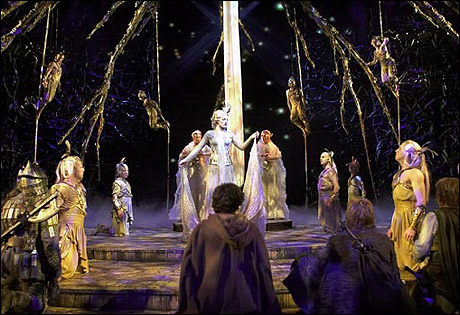 In case you were wondering, they couldn’t use Eowyn because there was no Rohan. They cut Rohan. They went straight from elves & co. to Minas Tirith and spidertime with nothing in between. I understand why: you may have noticed that the Lord of the Rings is very long, and difficult to reduce to the length of a two-ish-hour stage musical. But if you cut Rohan the whole thing becomes remarkably more efficiant, and you can turn the audience out on time while still having arguably done at least the beginning and end of the whole epic. It was rather surreal but fascinating from a perspective of how it made me re-analyze the structure of the whole thing. That is, when sudden, inexplicable Galadriel wasn’t there to give me mental whiplash. Or Legolas making incomprehensible hand gestures. In fact, the elves in general were problematic. There were some we saw strolling around in long dignified robes, while others in the same place (Lothlorian I think) were dressed like Peter Pan and Tinkerbell hanging from vines swinging around like tarzan, which is, in the abstract outside of Tolkien, acceptable elf presentation, and I could even see someone thinking it was a good idea to make the musical’s elves like that, but not to have BOTH those AND dignified long-robed Tolkein elves together, it was like having an anime character walk into a Pixar film. In the end I was very glad I saw it becuase it was an undeniably entertaining evening, and it’s certainly been fun describing it to people for the last seven years, but if someone asked me “Was it good?” I would definitely answer: “No. But it was great!” (And a great remedy for jetlag).
In case you were wondering, they couldn’t use Eowyn because there was no Rohan. They cut Rohan. They went straight from elves & co. to Minas Tirith and spidertime with nothing in between. I understand why: you may have noticed that the Lord of the Rings is very long, and difficult to reduce to the length of a two-ish-hour stage musical. But if you cut Rohan the whole thing becomes remarkably more efficiant, and you can turn the audience out on time while still having arguably done at least the beginning and end of the whole epic. It was rather surreal but fascinating from a perspective of how it made me re-analyze the structure of the whole thing. That is, when sudden, inexplicable Galadriel wasn’t there to give me mental whiplash. Or Legolas making incomprehensible hand gestures. In fact, the elves in general were problematic. There were some we saw strolling around in long dignified robes, while others in the same place (Lothlorian I think) were dressed like Peter Pan and Tinkerbell hanging from vines swinging around like tarzan, which is, in the abstract outside of Tolkien, acceptable elf presentation, and I could even see someone thinking it was a good idea to make the musical’s elves like that, but not to have BOTH those AND dignified long-robed Tolkein elves together, it was like having an anime character walk into a Pixar film. In the end I was very glad I saw it becuase it was an undeniably entertaining evening, and it’s certainly been fun describing it to people for the last seven years, but if someone asked me “Was it good?” I would definitely answer: “No. But it was great!” (And a great remedy for jetlag).
(A final note: thank you all for being patient this summer. I know my posts have been infrequent, but in addition to extensive travels and preparation to move from Texas to Chicago, this patch of silence has resulted from my intensive work finishing up 50 pages of carefully researched liner notes about Viking culture and mythology which will be printed in the libretto of my Norse myth a cappella song cycle (which you can pre-order here if you want to read them), and I’ve also been working hard finishing up the CD and DVD, preparing for my book launch next month (Reading Lucretius in the Renaissance), and doing many other sorts of work and writing. So the silence has served the greater good, but I will do my best to pick up the pace in fall after my move. And if you want to read something else right now, I have a new post up on Tor.com about whether or not female Thor should count as a Disney Princess. Enjoy! And, for all those who will be at Worldcon, do drop me a line – I’d love to see you.)

